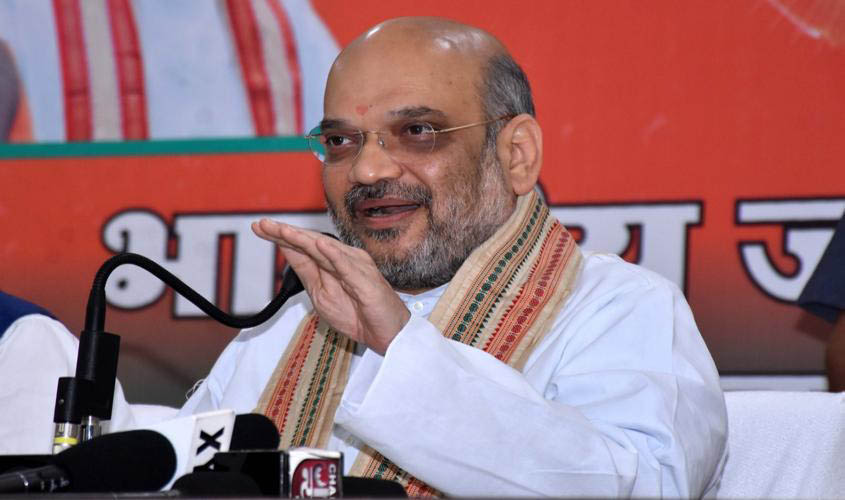 The BJP, evidently, is the first party to get off the blocks in the race for the 2019 Parliamentary polls. The Opposition, on the other hand, is still attempting to identify the issues, and has so far been playing into the Sangh Parivar’s hands by constantly making secularism, in one form or the other, its primary agenda. The BJP chief, Amit Shah unveiled his blue-print for the show-down at a strategy-meet on Thursday in the national capital where he fixed a target of 360 seats for his party.
The BJP, evidently, is the first party to get off the blocks in the race for the 2019 Parliamentary polls. The Opposition, on the other hand, is still attempting to identify the issues, and has so far been playing into the Sangh Parivar’s hands by constantly making secularism, in one form or the other, its primary agenda. The BJP chief, Amit Shah unveiled his blue-print for the show-down at a strategy-meet on Thursday in the national capital where he fixed a target of 360 seats for his party.
Sceptics may find this designed goal to be on the higher side, given that at present the BJP on its own steam has a strength of 282 in the Lok Sabha. However, politics is a game of possibilities, where objectives are attainable if adversaries succumb meekly without a fight. The Sharad Yadav sponsored “Save the Composite Culture” jamboree on the same day might have received the backing of the intelligentsia, yet for it to translate into an electoral victory over the BJP would take much more than what was on display.
The Opposition parties need to realise that they have to shed their secular stance and take the BJP on the basis of its performance. The Modi government’s vulnerability lies in the unfulfilled assurances the Prime Minister made prior to his coming to power in 2014. There is little to show on the job-front and a large number of BJP supporters are wondering why black money stacked abroad has not been found and retrieved. Farmers are distraught and disconcerted with the way things have turned out to be, and by and large, there is disillusionment over how the government has been unable to curb spiralling prices.
Amit Shah’s meet was aimed at ascertaining whether the “pro-people and pro-poor” schemes of the government have impacted the grassroots. Firstly, there is ambiguity about the “pro-people and pro poor” programmes, since these are interpretations derived from the electoral triumphs of the BJP, which were primarily an offshoot of superior planning and divisive agenda. The fact of the matter is that the BJP has come this far solely on the popularity of Narendra Modi, who, seemingly, does not have anyone in the Opposition ranks to challenge him. Therefore, if the victories are sought to be showcased as the endorsement of the policies of the government, then the BJP would only be deluding itself. Demonetisation has contributed to massive unemployment and its impact on the Indian economy has been an issue of deep concern. Thus, with no new jobs being generated and those who were gainfully employed losing their daily wages, the BJP, as well as the government, will have to do considerable amount of explaining to the affected people and their families.
Shah is also trying to discern if the cadres were satisfied with the response of the authorities regarding their concerns on varied issues. The mistake which the BJP’s central leadership and its government are apparently making pertains to their inaccessibility so far as the workers and elected representatives go. This was the cardinal sin committed by the Congress, when it lost power in 2014 as its high command was ever reluctant to take the feedback of party activists.
Any party, whether the Congress or the BJP, which alienates itself from its core supporters would definitely have difficulty in comprehending or assessing the truth as it exists. Therefore, the BJP must take cognisance of reality, which has the propensity of becoming clouded in the face of authority and power.
By commencing this exercise for the Parliamentary polls much in advance, Shah is at least trying to acquaint himself with the authenticity of the ground situation. The Opposition, on the other hand, is not even familiarising itself in this direction. Its sole purpose is to attack the Central government on its polarising agenda, as well as its pro-Hindu inclination. The Opposition has failed to realise that the BJP has succeeded in rendering the Muslim vote irrelevant in large parts of the country. Before Modi arrived on the scene, the minority vote was a vital ingredient of any poll formula, but this is not so anymore, a change which is yet to be accepted by the Sangh’s opponents.
Shah is equally dextrous and adept at playing mind-games. The 360 target is aimed at psyching the Opposition parties. The very fact that a number has been spelt out, will propel the Opposition in alerting the citizens that the BJP was planning to convert India into a Hindu rashtra. Inadvertently, by doing so, they would have subscribed to the BJP game plan. Modi and Shah cannot be evaluated through the prism used to measure the strengths and weaknesses of Atal Behari Vajpayee and L.K. Advani, when the latter were at their peak. Modi and Shah are 24×7 politicians, who have perfected the art of contesting elections in a distinctive fashion, which sets them noticeably apart from others in the Sangh Parivar. At any given time, they have the capacity to outwit their rivals. However, they still heavily rely on the RSS to meet their objectives. Majority of their victories have been on account of the dedicated RSS workforce. Therefore, it goes without saying that they should acknowledge the Sangh’s contribution in their continuing success story. It will be at their own peril if they underplay the significance of the Sangh. Between us.

